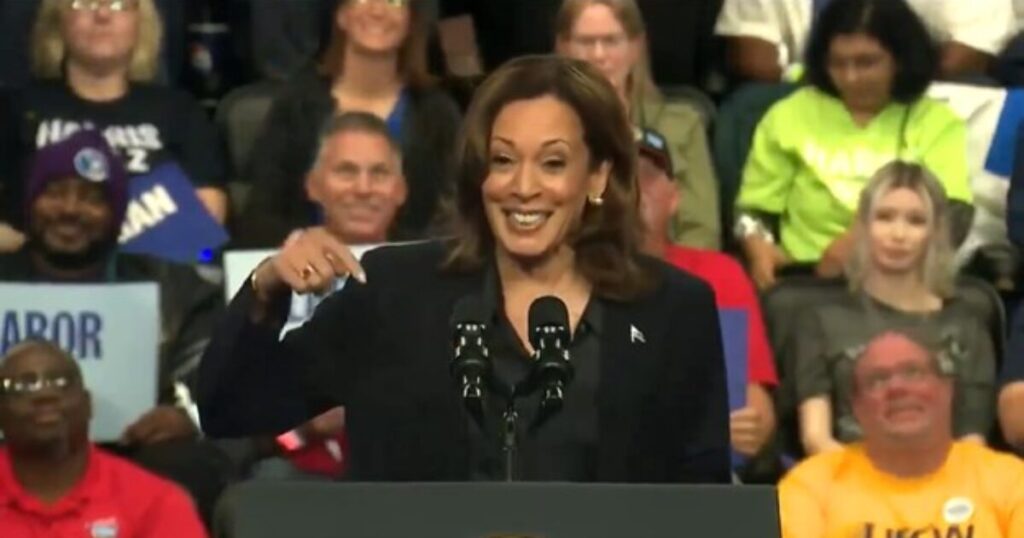Kamala Harris delivered a campaign speech in Flint, Michigan, highlighting the critical importance of the state in the upcoming election. Michigan, with its 15 Electoral College votes, is one of the primary swing states that could determine the outcome of the presidential race. In 2016, Donald Trump flipped Michigan, turning it red after a consistent six-term blue trend, which has made Democrats increasingly anxious about their chances of reclaiming the state. Harris’s campaign, positioned at a pivotal moment, underscores the party’s struggle to maintain its footing in a state that is integral to a national victory strategy.
The urgency surrounding Michigan reflects broader concerns among Democrats regarding their representation in other key states, particularly Pennsylvania, which is also viewed as part of the electoral “blue wall.” Observers are noting a significant anxiety among party leaders in Michigan, who are worried the state could slip further from Democratic control. Current polling demonstrates a neck-and-neck race between Harris and Trump, with the former president ramping up his campaigning efforts to attract support from demographic groups that Harris aims to win over, including Black men and working-class whites. Notably, the absence of endorsements from influential unions, such as the Teamsters and Firefighters, has compounded these worries, potentially signaling more favorable conditions for the Republican candidate among traditionally Democratic union members.
Despite the revived enthusiasm for the Democratic party following Harris’s arrival on the political scene, there are tangible concerns rooted in the party’s historical performance in the state. The stark memories of the 2016 defeat linger, along with a slim victory margin during the 2020 election, casting doubt on the ability of the Democratic ticket to solidify their base. The stakes are exceptionally high, and leaders within the party are vocal about the risks involved, as evidenced by comments from Michigan Rep. Debbie Dingell, who emphasized, “It’s not won.” This acknowledgment speaks volumes about the razor-thin margins that define the current political landscape.
Political observers have noted that recent missteps by Harris, including a technical glitch during her campaign speech, might reinforce the doubts surrounding her capability to rally voter support effectively. The momentary loss of her teleprompter not only impeded her speech but also raised questions about her preparedness and composure under pressure. Such gaffes are scrutinized in tight races, where every detail can be leveraged by the opposition to influence voter perceptions. Critics point to this incident as illustrative of broader worries about the campaign’s momentum and its competence in navigating a highly charged electoral environment.
As Michigan remains a focal point for both campaigns, Harris’s ability to connect with key voter demographics is increasingly crucial. The state’s electorate, which includes critical segments traditionally aligned with the Democratic party, may turn the tide depending on how successfully either candidate can appeal to their concerns and values. With Trump and his running mate, Ohio Sen. JD Vance, sharpening their strategies to court these voters, Democrats are grappling with the realization that the battle for Michigan is far from secure. Every rally, speech, and voter engagement strategy will become pivotal in determining if the Democrats can reclaim their standing in this vital state.
In conclusion, the situation surrounding Harris’s campaign in Michigan embodies the uncertainty and challenges faced by the Democratic party in the lead-up to the election. The convergence of strategic misfires, wavering voter loyalty, and the looming presence of a revived Republican campaign makes this race appear more contentious than ever. With the eyes of the nation on Michigan, the outcome will likely serve as a bellwether not only for the candidates involved but also for the broader electoral landscape. As campaign officials and supporters brace themselves for the final push, the stakes are undeniably high, and the quest for votes in this critical state is unfolding against a backdrop of significant apprehension and expectation.

